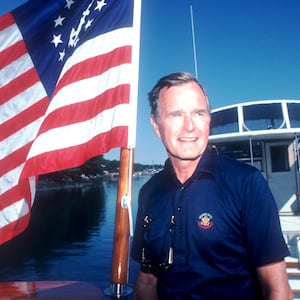When George H.W. Bush took the helm of the CIA in January 1976, the place was in a shambles. A little more than a year earlier, in December 1974, the New York Times disclosed how the CIA violated its charter and spied on U.S. anti-war groups. Seymour Hersh’s piece was based on part of a secret CIA history, known as the “family jewels,” that detailed everything from domestic wiretapping to assassination plots against foreign leaders such as Fidel Castro. By the time Bush became director, two congressional committees were investigating the CIA’s darkest secrets.
It was in this environment that Bush charmed the CIA at its most vulnerable hour. John McLaughlin, who remembers briefing Bush on communist parties in Europe, says he was “extraordinarily gracious.” “Every time you briefed him, you got a personal note thanking you,” said McLaughlin, who eventually rose to be acting director of the CIA.
Bush himself privately thought the offer from President Gerald Ford to lead the CIA was an effort to bury his political career, according to his published letters quoted in Tim Weiner’s history of the agency, Legacy of Ashes. Bush had been on the short list to be Ford’s vice president. Taking over a secret intelligence organization mired in scandal was not the smartest way to re-enter national politics in late '70s America.
But Bush soon came to love the CIA. For his 52nd birthday, the “masters of disguise” at the CIA’s Office of Science and Technology decided to give the future president a make-over. Bush was transformed into a man with red hair, thick glasses and a big nose. When he sat down at a meeting with other senior CIA officials, he kept his cover until he acknowledged, “I’m sweating under this thing.”
The late Duane Clarridge, who served as the chief of Arab operations at the time for the agency’s directorate of operations, said Bush was liked by many of the spies because he didn’t second-guess them. “He was very much of the view, ‘let the troops do their jobs,’” Clarridge said. “He was there to support them. He was very people-oriented.”
One example Clarridge remembered was when the U.S. had to evacuate the U.S. embassy in Beirut in June 1976. It was a complex operation, Clarridge remembered. Bush could have briefed Ford at the Oval Office, but instead he chose to monitor the operation from CIA headquarters. Thirty-five years later, CIA director Leon Panetta decided to stay at Langley and observe the raid that killed Osama bin Laden rather than huddle with the president at the White House.
While Bush was supportive of the rank and file, he also wanted to move some of the senior leaders at the CIA out of their jobs. One of the first things he did was to fire Bill Nelson, the chief of the directorate of operations under Bush’s predecessor. Bush also approved a controversial analysis of the Soviet Union’s military capabilities by a group of hawkish outside analysts known as “team b.” The in-house analysts at the CIA came to resent the report that was later used to justify increased defense spending in the Reagan administration. Many of the estimates of Soviet military strength, such as the view that the Soviets believed they could win a nuclear war, were later discredited after the Soviet archives opened up after the end of the cold war.
After Bush left the CIA, he became Ronald Reagan’s vice president and later president in a period in which he navigated the end of the Cold War and liberated Kuwait from Saddam Hussein’s military in 1991. In 1999, the CIA honored Bush by naming their headquarters at Langley, Va. after him. In a speech at the ceremony, Bush joked about how he lost the 1992 election. He struck a humble note, saying the rank and file had “every reason to be suspicious of this untutored outsider.” He said other CIA officers who had been killed in the line of duty, such as Richard Welch and William Francis Buckley, might be more deserving of the honor. He ended his speech saying, “It is an honor to stand here and be counted among you.”
An irony is that Bush’s son George W. Bush deeply distrusted the CIA during his presidency. In 2005, he appointed Porter Goss as director in an effort to control the leaks the president’s top advisers believed were aimed at trying to undermine the Iraq war.
Despite the controversy, the CIA emerged strong enough after George W. Bush’s administration to track down and kill bin Laden with special forces in Pakistan. The same could not be said about the CIA after George H.W. Bush’s brief tenure at the agency. In Legacy of Ashes, Weiner quotes a conversation between Bush and Ford’s secretary of state, Henry Kissinger. Kissinger laments that the United States in 1977 was unable to perform covert action anymore. “Henry, you are right,” Bush said, according to Weiner’s book. “We are both ineffective and scared.”
That is in contrast, though, to Bush as the 41st president who oversaw the collapse of the Soviet Union and the fall of the Berlin Wall. McLaughlin, who at the time was in charge of a group analyzing European communist parties, briefed President Bush two days before the fall of the Berlin Wall. He recalls that Bush remembered him after all those years.







